
Russian postcard by Planeta Publishers, Moscow, no. 8, 1972. Photo: Ju. Bykovskogo.
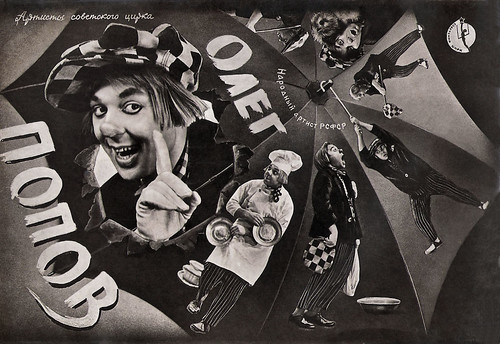
Russian postcard by CRC Soyuzpechat, Moscow, no. 2261. Photo: A. Šapiro. This postcard was distributed in 12.800 copies. The retail price was 8 Kop. Caption: People's Artist of the RSFSR.
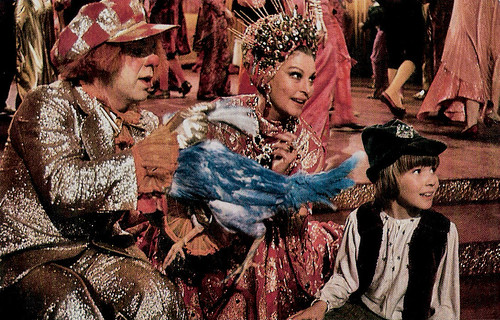
Russian postcard. Photo: Oleg Popov, Ava Gardner, and Todd Lookinland in The Blue Bird (George Cukor, 1976).

Russian postcard by fy, no. 12679. Photo: M. Seljučenko. This postcard was distributed in 450.000 copies. The retail price was 3 Kop. Caption: Be respectful!
Juggler and slack-wire artist
Oleg Konstantinovich Popov was born in 1930 in Vyrubovo near Moscow in the former Soviet Union. He was the son of a clock repairman and a photo retoucher. According to Dutch Wikipedia, Popov's father was arrested in 1937 after he accidentally damaged a watch that was intended for the Soviet dictator Joseph Stalin. The family never heard again from him.
At age 12, Oleg began working as an apprentice typographer for the newspaper Pravda, and he later joined the Pravda's Athletic Club. There, in 1945, someone suggested that he should apply for Moscow's State College of Circus and Variety Arts nearby. He was accepted and studied acrobatics, juggling, and other circus skills. He graduated in 1949.
At 19, he made his debut as a juggler and slack-wire artist at the Tbilisi Circus in the Georgian SSR. Later, he continued his career at the Great Moscow State Circus, on Tsvetnoy Boulevard. This was a government-run circus organisation and still exists today as Circus Nikulin. The circus was a vital part of life in the Soviet Union where, typically every year, more than 70 million citizens would attend one or more shows put on by more than 100 troupes.
Oleg Popov's comic abilities were spotted only after the Second World War. In 1950, the famous clown Karandash invited him to join him on a tour as his assistant and partner. In 1954 Popov got his big break when he replaced Pavel Borovikov when this clown was injured. Popov's act was a huge hit. Popov portrayed a gentle little man baffled by the big, precarious world. His clown character followed the tradition of the Russian folk character Ivanushka, who fools other people and who is teased himself. His act also incorporated his skills as an acrobat, juggler, and animal trainer.
In 1955, Popov performed abroad for the first time, in Warsaw. The following year, he toured with the Moscow Circus in France, Belgium, and England. It was the first foreign performance by a Soviet circus group. He was immediately noticed by the press and became an international circus star.
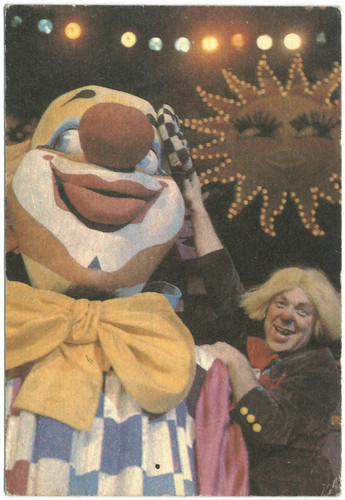
Oleg Popov_Vbpstsi (1981). Collection: Manuel Palomino Arjona (Flickr).
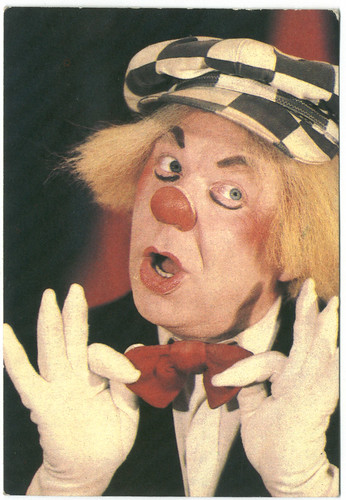
Oleg Popov_Vbpstsi (1981). Collection: Manuel Palomino Arjona (Flickr).
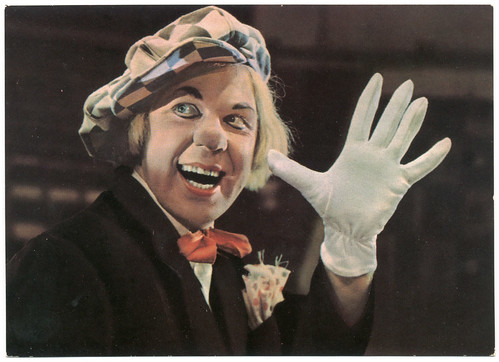
Circus Clown Oleg Popov_Soviet Circus; 394. Znakomtes Soviet Circus_Miniterio de Cultura & Soyugostsirl. Collection: Manuel Palomino Arjona (Flickr).
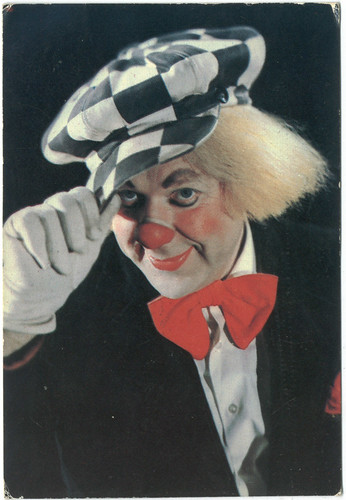
Clown Oleg Popov_Soviet Circus (1982). Collection: Manuel Palomino Arjona (Flickr).
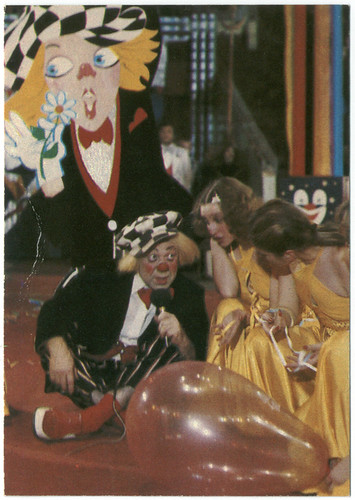
Oleg Popov_Vbpstsi (1983). Collection: Manuel Palomino Arjona (Flickr).
A goodwill ambassador for the Soviet Union
The Soviet regime quickly built on his success abroad and transformed Oleg Popov into a goodwill ambassador for the Soviet Union. He was broadcast from Moscow on American television in 1957, and he appeared at the Brussels World Fair in 1958. With the Moscow Circus, he toured the United States in 1963.
Popov appeared in a dozen films, including Арена Смелых/Ring of the Braves (Sergei Gurov, Yuriy Ozerov, 1953), the comedy Kosolapyy Drug/Clubfooted Friend (Vladimir Sukhobokov, 1959), the Bulgarian drama Ritzar bez bronya/Knight Without Armour (Borislav Sharaliev, 1966) and the musical Ma-ma/Mummy (Elisabeta Bostan, 1977). Jens August at IMDb about Ma-ma: "I can understand why this makes so much effect on both children and adults. It has everything you can fantasize about. Great acting and choreography, and all the small and great details in costumes and makeup. The actors's facial expressions are spot-on for the animals they are playing. As a child, you connect to them at once."
Popov also appeared as a clown in The Blue Bird (George Cukor, 1976), starring Elizabeth Taylor, Jane Fonda, and Ava Gardner. This was the first official co-production between the United States and the Soviet Union, and the third screen adaptation of the children's story by Maurice Maeterlinck about two children who set out to find the Blue Bird of Happiness. The film, made in Russia, had a notoriously difficult production and was a box office failure.
Craig Butler at AllMovie: "Cukor, normally a sensitive and imaginative director, has directed with no sense of style and very little competence. Some of the costumes, at least, are nice, but they're balanced by those which border on the grotesque. Blue Bird holds a certain fascination, as one of those "How did this happen" kind of films, but it loses that appeal long before its 100 minutes comes to an end." Michael Elliott at IMDb: "It's strange to see all the talent that is wasted here but at the same time I think fans of the weird and surreal will probably want to check this out and they might get a few kicks out of it. This version here is completely weird from the opening scene to the last but I think this here is what keeps it entertaining."
Popov's final film was the Soviet-Czech family film Postoronnim vkhod razreshyon/Free Admittance (Josef Pinkava, 1987), based on the books by Natalya Durova. He published a book of memoirs in 1967, which has been widely translated into numerous languages, in English as 'Russian Clown' (1970). In 1969, Oleg Popov was honoured with the title of People's Artist of the USSR. He toured extensively around the world in subsequent years with the Moscow Circus. In Australia, he was named 'King of Moomba' (1971).
In the early 1990s, at the fall of the Soviet Union, Oleg Popov began touring for a few years with a unit of the Moscow Circus in Germany, where he eventually resettled. He later performed extensively in Germany, in circus shows, on television, or with his own touring show. In 1991, he married Gabriela Lehmann, a German circus performer, who was 32 years younger than her husband. Popov was previously married to violinist Alexandra Ilinitsjna Ryslavskaja. They had a daughter, Olga Popova (1953), who is also a circus artist and lives in Germany.
In 2006, Popov was invited to perform at the 30th anniversary of the International Circus Festival of Monte Carlo. Aged 75 years of age, he received a standing ovation. In 2015, he returned for the first time to Russia after 28 years of living in Germany. At the First Master gala event at the State Circus of Sochi, he was greeted with a long-standing ovation.
Oleg Popov died on 2 November 2016, from a cardiac arrest while on tour, at a hotel in Russia's southern city of Rostov-on-Don. He was 86 (some sources say 87).

Russian postcard in the 'Animals at the circus' series by Planeta Publishers, Moscow, no. 7, 1975. Photo: V. Panjarskozo. Caption: Alexander Popov and his "scientist" dog in the attraction 'Dr. Aibolit'.
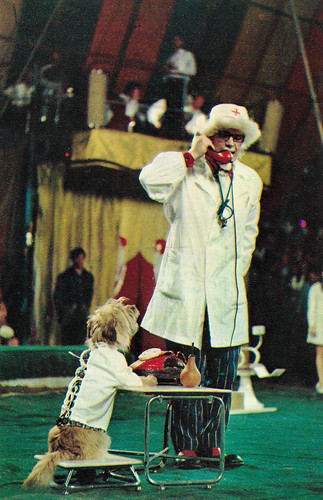
Russian postcard in the 'Animals at the circus' series by Planeta Publishers, Moscow, no. 8, 1975. Photo: V. Panjarskozo. Caption: Dr. Aibolito's.

Russian postcard in the 'Animals at the circus' series by Planeta Publishers, Moscow, no. 15, 1975. Photo: V. Un Da-tsna. Caption: Animals are frequent partners of Oleg Popov, People's Artist of the USSR. An invitation to a cup of tea.
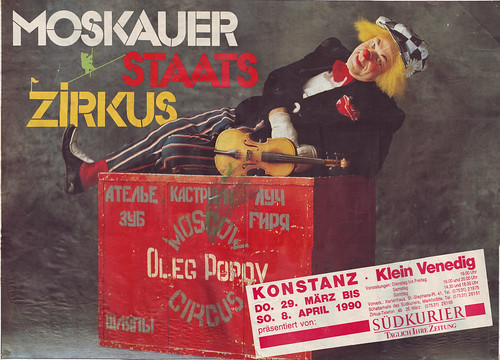
Oleg Popov (Moskauer Staats Zirkus. 1990), Collection: Manuel Palomino Arjona (Flickr).
Sources: Craig Butler (AllMovie), Jens August (IMDb), Michael Elliott (IMDb), The Moscow Times, BBC, Encyclopaedia Britannica, Wikipedia (English and Dutch), and IMDb.
No comments:
Post a Comment